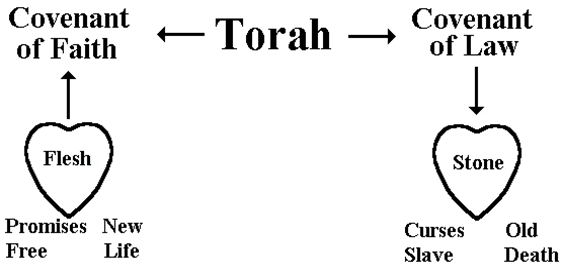Galatians 3.10,11,21-25
All who rely observing the law are under a curse, for it is written: "Cursed is everyone who does not continue to do everything written in the Book of the Law." Clearly no one is justified before God by the law, because, "The righteous will live by faith." ..... Is the law, therefore, opposed to the promises of God? Absolutely not! For if a law had been given that could impart life, then righteousness would certainly have come by the law. But the Scripture declares that the whole world is a prisoner of sin, so that what was promised, being given through faith in Yeshua the Messiah, might be given to those who believe. Before this faith came, we were held prisoners by the law, locked up until faith should be revealed. So the law was put in charge to lead us to Messiah that we might be justified by faith. Now that faith has come, we are no longer under the supervision of the law.
This passage, and many others like it, have a very negative view of "law". One of the most misunderstood words in the writings of Paul is the Greek word nomos (law), equivalent to the Hebrew word תורה (torah, Strong's #8451). When reading Paul, we find what appears to be contradictions within his own writings because of this misunderstanding of the word "Law". Compare the following passages from the book of Romans;
- It is not those who hear the law who are righteous in God's sight, but it is those who obey the law who will be declared righteous. (2:13)
- no one is declared righteous in his sight by observing the law; rather, through the law we become conscious of sin. (3:20)
- Do we, then, nullify the law by this faith? Not at all! Rather, we uphold the law. (3:31)
- So, my brothers, you also died to the law through the body of Messiah, that you might belong to another. (7.4)
- What shall we say, then? Is the law sin? Certainly not! (7:7)
- I see another law at work in the members of my body, waging war against the law of my mind and making me a prisoner of the law of sin at work within my members. (7:23)
Paul is clearly using the word Torah in many different ways much like we use the word law in many different ways, such as;
- Federal Law
- State Law
- Local Law
- Moral Law
- Martial Law
- Laws of Physics
- Common Law
- Murphy's Law
- Law of Moses
- Grimm's Law
When I use the word law, the context dictates which type of law I am speaking about. The recipients of Paul's letters understood what context he was writing in.
Paul uses the word "law" 108 times in his letters to the Romans and Galatians. The following passage shows what "law" Paul is speaking of most of the time.
Gal 3.16,17
The promises were spoken to Abraham and to his seed.....The law, introduced 430 years later, does not set aside the covenant previously established by God and thus do away with the promise.
The 430 years is the time between the promises was given to Abraham and the Covenant given at Mt. Sinai with Israel. Was the Torah introduced at Mt. Sinai? No, for Abraham knew and obeyed the Torah (Gen 26.5), The "law" that was introduced at Mt. Sinai is the covenant, which turned the Torah into law by its blessings and curses. Paul is contrasting the two covenants, the covenant of faith (living by the Torah internally) and the covenant of law (living by the Torah externally).
Another example to show that Torah can mean covenant is the term "Book of the law" as found in Deut 28.62 and 29.21 and quoted by Paul in Gal 3.10. This phrase is equivalent to the term "Book of the Covenant" as found in Ex 24.7. The word Torah can be a reference to the covenant distinct from the "teachings" of God.
One other word used throughout Paul's letters to the Romans and Galatians, is the Greek word pistos (faith), which is equivalent to the Hebrew word אמונה (emunah, Strong's #530). Somehow this word has come to mean "a trust in the work of another person", such as in "I have faith that God will do what he says".
The Hebrew word emunah means to be firm, such as in Exodus 17.12 where Aaron and Hur held up the hands of Moses during the battle with the Amorites and "his hands remained steady (emunah) till sunset".
The Oxford Greek dictionary defines pistos as a person that is credible, relied on, obedient, trusted, bound by a pledge. The Greek meaning of this word is clearly one who holds firmly to something. A man of faith is not one who trusts another, but one who can be trusted. What is the faith, which Paul continually calls us to hold onto firmly? That we can be trusted with? The promises and teachings of God as in Yeshua's examples and the teachings of his Talmidiym (students); "this is love for God, to obey his commands" (1 John 5.3).
The word faith is paralleled with the Hebrew word אהבה (ahavah, Strong's #160), which is often translated as love but more means to take care of, protect and provide, as we can see in many places in the book of Psalms (57.3, 61.7, 85.10, 86.15, 89.14, 92.2, 98.3, 115.1, 138.2). Therefore, love and faith are similar in meaning. From all this we can conclude that faith is the covenant of promise, God promises to bless and we promise to follow his teachings.
If we re-read the Gal 3 passage which we started with, using the phrase "Torah of obedience" (the covenant given at Mt. Sinai) for the word "law" and the phrase "Torah of love" (the covenant of promise given to Abraham and to us in the Covenant of renewal) for the word "faith", the passage will be opened to a fuller understanding.
Galations 3.10,11,21-25
All who rely observing the Torah of obedience are under a curse, for it is written: "Cursed is everyone who does not continue to do everything written in the Book of the Torah of obedience." Clearly no one is justified before God by the Torah of obedience, because, "The righteous will live by Torah of love." ..... Is the Torah of obedience, therefore, opposed to the promises of God? Absolutely not! For if a Torah of obedience had been given that could impart life, then righteousness would certainly have come by the Torah of obedience. But the Scripture declares that the whole world is a prisoner of sin, so that what was promised, being given through Torah of love in Yeshua the Messiah, might be given to those who believe. Before this Torah of love came, we were held prisoners by the Torah of obedience, locked up until Torah of love should be revealed. So the Torah of obedience was put in charge to lead us to Messiah that we might be justified by Torah of love. Now that Torah of love has come, we are no longer under the supervision of the Torah of obedience.
You can now read Romans and Galatians in this light and better understand what Paul means by "law".

Like what you’re discovering? Continue the journey from Bible reader to translator.
|







